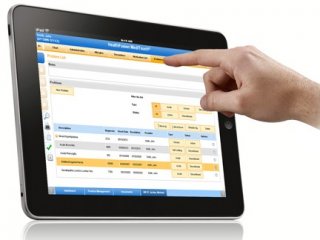
- Description
- Objectives
- Outline
- Materials
- Certification
- System Requirements
- Watch a Demo
Our Electronic Health Records Specialist with Medical Billing program will help you gain a better understanding of the EHR systems and the practical use of such systems in a health care provider office setting, while learning about medical office operations, including diagnostic and procedural insurance forms processing.
Electronic Health Records
After completing this course, you should be able to:
- Identify the developmental challenges associated with creating electronic health records
- Define electronic health record and its advantages and disadvantages
- Recognize the importance of patient data privacy
- List the steps for basic coding techniques
- Name the steps for documenting in the EHR
Medical Billing
After completing this course, you should be able to:
- Identify the core elements of health insurance
- List features of the different coding systems and their documentation
- Define the features of processing claim forms both electronic and paper
- Recall the basics of fee and insurance collection
- Recognize the features of various health care payer types
Electronic Health Records
Electronic Health Records Module 1
Introduction to the Electronic Health Record
- What is a Health Record?
- Who Documents in the Health Record?
- Who Owns the Health Record?
- The Electronic Health Record
- Advantages of Electronic Health Records
- Disadvantages of Electronic Health Records
- Role of the Healthcare Professional Using the Electronic Health Record
- Professional Organizations
Electronic Health Records Module 2
Overview of SimChart
- The Medical Practice and Electronic Health Records
- Accessing SCMO Through Evolve
- Getting Comfortable with Electronic Health Records
- SCMO Assignment View
- Features in SCMO
- Establishing and Maintaining a Patient Registry
- Internet Use in the Medical Practice
Electronic Health Records Module 3
Privacy, Confidentiality and Security
- HIPAA Law
- Confidentiality vs. Privacy
- Security Safeguards for the Medical Practice
- Patients’ Rights Under HIPAA
- Access to Protected Health Information
- Patients Protecting Health Information
Electronic Health Records Module 4
Administrative Use of the Electronic Health Record
- Role of the Front Office Assistant
- Communication in the Medical Office
- Incident Reports
- Managing Electronic Health Records
- Calendar
Electronic Health Records Module 5
Clinical Use of the Electronic Health Record
- Documentation in the Electronic Health Record
- Clinical Documentation in the Patient Record
- Tracking Health Screenings and Immunizations
- Using the Electronic Health Record for Patient Education
- The Progress Note
Electronic Health Records Module 6
Using the Electronic Health Record for Reimbursement
- Healthcare Reimbursement
- Revenue Cycle
- Coding Systems
- HCPCS
- Pay for Performance
- SuperBill
- Patient Ledger
- HIPAA 5010 Claim Processing
- Medical Necessity
- Fraud and Abuse
- Patient Statements
- Reporting Features of an EHR
Electronic Health Records Module 7
The Personal Health Record and Patient Portals
- What is a Personal Health Record?
- Innovative Features of Personal Health Records
- Benefits to Providers
- Steps in Creating the Personal Health Record
- Maintaining the Personal Health Record
- Patient Portals
**Outlines are subject to change, as courses and materials are updated.**
Medical Billing
**Outlines are subject to change, as courses and materials are updated.**
All course materials included.
Electronic Health Records
Upon successful completion of our Electronic Health Record Specialist course, students will be prepared for an entry-level position as an Electronic Health Record Specialist in a medical office and to sit for the National Healthcareer Associations' (NHA) national certification exam to become a Certified Electronic Health Record Specialist (CEHRS).
Note: This course is not affiliated with, nor has it been endorsed by National Healthcareer Associations (NHA).
Internet Connection
- Broadband or High-Speed - DSL, Cable, and Wireless Connections
*Dial-Up internet connections will result in a diminished online experience. Classroom pages may load slowly and viewing large audio and video files may not be possible.
Hardware Requirements
- Processor - 2GHz Processor or Higher
- Memory - 1 GB RAM Minimum Recommended
PC Software Requirements
- Operating Systems - Windows 7 or higher
- Microsoft Office 2013 or higher. Also, you could use a general Word Processing application to save and open Microsoft Office formats (.doc, .docx, .xls, .xlsx, .ppt, .pptx)
- Internet Browsers - Google Chrome is highly recommended
- Cookies MUST be enabled
- Pop-ups MUST be allowed (Pop-up Blocker disabled)
- The Kindle Reader App or VitalSource Bookshelf App are needed for many of our courses (No special equipment needed. This can be downloaded for FREE onto your computer.)
- PowerPoint Viewer (if you do not have PowerPoint)
- Adobe PDF Reader
- QuickTime, Windows Media Player &/or Real Player
MAC Software Requirements
- Operating Systems - Mac OS x 10 or higher with Windows
- Mac office programs or a Word Processing application to save and open Microsoft Office formats (.doc, .docx, .xls, .xlsx, .ppt, .pptx)
- Internet Browsers- Google Chrome is highly recommended
- Cookies MUST be enabled
- Pop-ups MUST be allowed (Pop-up Blocker disabled)
- The Kindle Reader App or VitalSource Bookshelf App are needed for many of our courses (No special equipment needed. This can be downloaded for FREE onto your computer.)
- PowerPoint Viewer (if you do not have PowerPoint)
- Adobe PDF Reader
- Apple QuickTime Media Player
